- Home
- Madeleine Roux
Sadie Walker Is Stranded
Sadie Walker Is Stranded Read online
For my family, friends and professors
“You’ll get back to where you came from.”
—William Golding, Lord of the Flies
CONTENTS
Title Page
Dedication
Library Stamp
Epigraph
Chapter 1
Chapter 2
Chapter 3
Chapter 4
Chapter 5
Chapter 6
Chapter 7
Chapter 8
Chapter 9
Chapter 10
Chapter 11
Chapter 12
Chapter 13
Chapter 14
Chapter 15
Chapter 16
Chapter 17
Chapter 18
Chapter 19
Chapter 20
Chapter 21
Chapter 22
Chapter 23
Epilogue
Acknowledgments
Library Checkout Card
Also by Madeleine Roux
About the Author
Author Photo
Copyright
ONE
“I can’t make this.”
“But Jason…”
“There’s just no audience. No one will want to read this so no one is going to make it, especially—especially—not me. I’m sorry, Sadie, but it’s not gonna happen. The pictures are great, maybe some of your best, but it’s too soon. Way too soon.”
“You said things were changing,” I said. A whining note crept into my voice. “We could run just a short issue, a teaser. Maybe see if there’s interest…”
“There won’t be. It’s a waste of my time and—sorry—yours too.”
Jason was a genius, a penny-pincher and—sometimes—an idiot. Most successful people are. But I thought he would go for it, I really did. My sketches sat spread out in front of him, panels and whole pages with empty speech bubbles where words would eventually go. Well, with Jason’s latest decision, make that where words would never go. With his green light, that would have been someone else’s job—a writer’s job. Me? I’m just Sadie Walker, illustrator. I handle the art, the “way too soon” art that apparently nobody wanted to see.
At least Jason had given the pages a good look-see. He tried. His fingertips were smeared with pencil lead when he peeled them away from the drawings and raked them through his thinning gray hair. With a little sighing laugh I gathered up the pages and stuffed them back in my folder. I’m not sure what I expected. It’s not like life was a series of triumphs these days. Just managing to eat and not smell like a sewer was a big accomplishment.
I turned to go, one corner of my drawings sticking out, a blood-drenched ax peeking at me like a winking albino eye.
“Well, thanks anyway,” I said. “Maybe next year.”
“Probably not.”
Jason’s apartment, his “studio,” sat on the western edge of what’s left of Capitol Hill in a cozy and crooked brownstone nestled against the east side of Melrose Avenue. The whole place reeked of corn beef hash from the abandoned diner downstairs. He said something I didn’t quite catch as I shut the door and made my way down the cramped hall to the stairs that led into the diner’s storeroom. It was empty now, stale and spotted with months-old coffee and ketchup stains. Nobody had eaten there since September, when The Outbreak started. The chairs and tables and fry baskets were still overturned from when things went bad, and the kitchen doors remained cocked open, showing the messy, pillaged shelves and countertops beyond.
With the portfolio of sketches close to my chest I stepped back outside. A stiff wind caught a few street pamphlets and sent them wheeling down Melrose; cold for April but not unbearable. March was worse, colder, and the food was leaner, making every drop of blood in your veins run a little bit slower. Nothing like hunger to intensify a chill. There were two bus lines up and running now and the pamphlets said there might even be three by the end of April. Who could guess? Two was all we had and even that felt like a luxury.
Leaving Jason’s studio, I considered just how lucky I was to still have something, however small, to remind me of what I used to be. “Illustrator” didn’t mean much now. My friend Andrea joked that I took my old job too seriously, that the only job that mattered now was survival. But I’d go mad, completely nuts without those pages, even if survival really was the only thing worth fighting for.
The view here looking down to the waterfront was mostly unobstructed. The Space Needle was still standing, of course, jilted and sad in the dark blue overcast sky, and the few skyscrapers we had never toppled. But entire city blocks had vanished, burned down in the panic or pulled apart afterward to make room for gardens and livestock pens. The streets used to smell like rain and earthworms, with the occasional waft of coffee or donuts from a café. Now the aroma is more Tombstone than Sleepless in Seattle—dirt, manure and decay stamped out the clean rain smell.
This early in the morning—four o’clock, to be exact—Seattle wore an eerie cast of rising purple, like an embarrassed flush, and it was easy to see why. In the chaos, big cities fared the worst. So many people, so many things to destroy and burn—it was unavoidable that the aftermath here would be bleakest. From here, miles away from the waterfront, you could still see the Golden Princess cruise liner in the harbor, half sunk, like a miniature city descending gradually to its demise, a white-gold Atlantis. The rumor at the time was that everyone on board the cruise perished, and not only that, but someone on board was the carrier, the undead transmitter that spread The Outbreak to Seattle.
Looking at her now, all broken windows and crumbling stern, she seemed like a stand-in for a movie, a Titanic played out in small, modern scale.
At that hour the buses had started running but I hoofed it anyway. It was about a three-minute drive to the market by car, but nobody really drove. Any spare gasoline went straight to the buses. With the wind biting at me, I kept the folder and my sketches close in to the chest. They were precious—to me, at least—a blueprint, a project I’d been working at for months. I tucked the corner page with the ax down into the folder and turned up the woolly scarf around my neck, hunkering down for the mile or so walk to the market. By now the lines would be massive, but there was a hungry nephew waiting at the apartment, still asleep, if there was any justice left in the world. I couldn’t be sure there was.
A few months ago, a casual walk through town to the market wouldn’t have been possible. Back then, the terror of The Outbreak was still in full-swing. What was empty, stained pavement now was covered in moldering corpses, some just waiting to get up and have a second go. There were lots of strays, too, some bitten, but the virus seemed to affect animals differently. I guess their systems can’t handle it the way ours can. A bitten dog would be a threat for a few short hours and then they would keel over. Some parts of town had looked like Cruella de Vil’s Dumpster.
The walk to the market, unfortunately, left plenty of time to mull over Jason’s chilly reception of my work. He was no stranger to me and I showed up at all hours with new sketches for him to peruse. Months ago, and what feels like forty million years ago, Jason was my boss, my editor. He was the only one left at the press and these days one of only three presses in the city. And when I mean press, I mean it literally—a nineteenth-century cast-iron book press. Everything he produced now was by hand, painstakingly inked and pressed, and every illustration was done by yours truly. Electricity was still unreliable so it was safer to just use the ancient press. Mostly we did what we always had—make quirky little books for kids about talking gophers and otters with adventure on the brain. There were still small kids around and they still needed entertainment.
But Jason had one rule, and it was t
he one rule I tried to break today: Nothing heavy.
It made sense—at least for a while—to focus on the uplifting. When your mom or dad or sister or brother had been eaten by a next-door neighbor or burned to death in a fire, it was nice to have an escapist tale about a wily, quick-thinking sea anemone outsmarting a shark. But I was hoping that Jason would be ready to try something new, something daring. So while my nephew, Shane, continued helping me think up cute stories to trade to parents for vegetables or clothes, I was leading a sort of double life, drawing what I really wanted to draw.
I felt a disappointed shiver, then a quiver in my lip. The panels had taken months of late nights to complete, with me bent over a row of candles, destroying what was left of my eyesight to sketch and ink a comic aimed at adults. I thought the story might give them hope in a different kind of way. But maybe Jason was right. It was too soon—too soon to be telling stories about fighting the undead, about the pain of loss and the greater pain of being betrayed by the living.
As I trooped down Boren the city came slowly to life. Lanterns behind windows sent up low, orange signal fires and men and women in Wellingtons and fingerless gloves emerged from their homes to tend community gardens. It was hard work, keeping a winter garden, and the kind of labor that got you out of bed at ungodly hours to rake mulch or repair raised beds for beets and cabbages. Too much carelessness, too much oversleeping meant someone went hungry.
Looming over the vegetable gardens, hooked to street lamps and windows, hung painted wooden signs and graffiti. THEY’RE NOT YOUR FAMILY IF THEY’RE INFECTED, read one. DO THE RIGHT THING: ALERT THE AUTHORITIES or another, OBSERVE THE CURFEW.
A street pamphlet careened up the street toward me, grabbing at my ankle. I paused and bent to retrieve it. The flyer, as usual, was garish—bright green paper, bold black font like a flyer for a topless bar. Impossible to miss. I read as I walked, perusing the latest news. There were radio shows and even a few television programs, but Shane and I weren’t the types that could afford them. Most citizens relied on the street pamphlets to deliver their news, and the presses that provided them took an immense amount of pride in their work. It was old-school journalism. No celebrity birthdays or overdosing starlets, no CEOs fleecing their hardworking employees, just facts—weather tables for farming, locations where someone was giving away food or clothing …
And of course there was always at least one article about the population freaks. They preferred the term Repops or Repopulationists, a kind of religious or social group (some said cult) that feel a divine calling to repopulate the city and—I suppose in their warped minds—the world. The pamphlet was nice enough to refer to them as Repops, but everyone I knew just called them Rabbits, because all they seemed to want to do was shut themselves up in some hidey-hole and screw, screw, screw. And for months they had done just that, until the elected city council caved from public pressure and told them to cut it out. The Rabbits liked to brag about how many pregnant women they had. Then the city grew some balls and pointed out that those babies would be a major drain on city resources. Now the Rabbits didn’t feel welcome and they were threatening to leave, taking with them a workforce the city—we—badly needed.
I was still perusing the pamphlet when I reached Pike Place. The hill sloping down to the fish market had become slick with misty rain and I nearly flew headlong into the line waiting for food. Not even five in the morning and already the line extended to 1st Avenue. But that was all right, I had expected that. With a hefty tote in one arm and my portfolio stuffed full of sketches in the other, I sidled up close to the stranger in front of me. Nobody was recognizable beneath their hooded sweatshirts and scarves. At this hour, even in April, a foul chill crawled up from the nearby waterfront. We might have been a horde of dock workers and clock makers and shoe shiners, a bleak Dickensian postcard of hungry people just trying to eke out a living. But it wasn’t 1855, it was 2010. And we weren’t recovering from an outbreak of cholera, but from The Outbreak.
But since The Outbreak things had stabilized. Stabilized. That’s the word the street pamphlets liked to use—“the situation has stabilized.” The fear was that the Rabbits leaving would upset the balance. If they stayed they would fuck things up and if they left they’d be a nuisance too. These people attracted hostility and vitriol like a corpse attracts maggots. I didn’t quite get it. Couldn’t they just slow down? There would be time to make babies and I couldn’t see why anyone would be in such a hurry.
“Stabilized, my ass.”
The man that had gotten in line behind me had read the pamphlet over my shoulder. He had a strong Polish accent. I gave him a wan smile. “Could be better,” I said with a shrug, “could be worse.”
That might’ve been true, at least in Seattle, which wasn’t called Seattle much anymore. Back in September, when The Outbreak began, a group of firemen decided to take matters into their own hands. There was only one way to save the city, they thought, keep the living in and the undead firmly fucking out. They sealed off the city and enlisted as many volunteers as they could, and with an untold number of sandbags and cinder blocks, they had turned Seattle into what it is now, the Citadel. The waterway is still open, a meager fleet of boats still comes and goes, but there’s one landroute into the city and one route out and it’s guarded three-sixty-five, day and night. In December the sealing off of the city was completed and by early February the street pamphlets declared that the last of the undead had been cleared out of the city, hopefully for good. What anyone planned to do with the hideous no-man’s-land just outside the city, nobody could say. All the same, Seattle—the Citadel—had become a haven, one sprawling, struggling refugee camp.
I looked at the man ahead of me—I assumed it was a man, but in the chunky sweater and hood he could’ve been a thickly padded mannequin—as he stamped his feet to keep the blood moving through his legs. I couldn’t help but wonder where he had come from, where he lived now. He hacked a cough into the crook of his elbow. Everybody coughed. You got used to it.
The first Tuesday of every month, a caravan of trucks snaked into the one gated entrance to the city. They lumbered over to the old Pike Place Fish Market, now strictly a vegetable and food market, and dumped whatever produce they had managed to grow. The fruits and veg were sorted and carted to different stalls. The lines on Tuesdays started forming up at four or five in the morning, wending up and across the cobbled avenue leading down to the market—hundreds, thousands of people huddled together in the pink dawn glow, bags and baskets tucked under their arms.
There were fish to get as well—not the big, fatty beautiful fish we had eaten in better years but fish all the same. They came in brown paper packages, lightweight and smelling strongly of the sea—smelt and seaperch, salmon if we were lucky, cut and dried into leathery strips. A strip or two could flavor a big pot of cabbage soup and feed six or eight people. We made those packages of dried fish last all month long. The crowd was getting louder, rowdy, everyone in line shuffling anxiously, ready to get going and start their day.
“Fucking Rabbits. They haul ass out of the Citadel yet?”
I jumped, nearly dropping the street pamphlet. It was Carl, my boyfriend. He wrapped me up in a hug and I was grateful for the warmth. It’s hard to hug back with so much stuff in your arms, but I managed. It was nice to see him. I felt just a little relieved to have company, a familiar face among a sea of coughing strangers. Carl, my boyfriend. Carl my boyfriend who was supposed to be watching Shane. I whirled on him.
“What are you doing here? Where’s Shane?”
“Don’t sweat it. Shane’s with my friends.”
“Which friends?”
Carl shrugged, his lanky shoulders flying up around his ears like a pair of bony wings. “Dave and Jill,” he said. “They’re cool. They work over in Queen Gardens.”
“I don’t care where they work, Carl, I don’t know them. You can’t just leave Shane with strangers, he’s not a Cuisinart!”
Shane is shy, bookish. H
e doesn’t like strangers. He barely tolerates me, his own flesh and blood.
Carl heaved a dramatic sigh, his deep-set brown eyes rolling a complete three-sixty. I fold up the pamphlet and swatted him hard on the shoulder with it. On the back of the paper was a list of names, a lost and found of people. I was about to tear into Carl again when a fire truck rumbled by, three men in heavy rubber uniforms tucked along the ladder. They were going awfully fast for this part of town.
It was hard to stand still knowing that Shane was being watched by strangers. Trust is a commodity these days, and one I’m generally short on. I like Carl, but his parenting skills are about as sharp as a sea cucumber. I glanced back up the rising hill toward the distance, where the apartment was, the bottom floor of a stout apartment on Bell. Looking back at the market I saw the farmers had brought out the bins and the line was surging forward to push their ration papers into the farmers’ hands. The front of the line disappeared into the shadow of the fish market, the coppery pig statue swarmed with hungry people with the distinctive PUBLIC MARKET CENTER crooked and straining at its hinges like an ox pushing into its yoke. I felt suddenly claustrophobic, short of breath.
“Here,” I said, shoving the market bag at Carl. “You stay and get the food. I’ll go back to Shane.”
“He’ll be fine.”
“He better be.”
The ration papers were in my pocket. They stated in slanted handwriting that Shane and I, making up a family, were entitled to two bags of mixed vegetables, fruit and a packet of dried fish. These were in exchange for the beets and cabbages our family garden contributed to the city’s food supply. My hand-drawn children’s books don’t officially rate of course, but they’ve helped to barter for medicine and blankets in a pinch.
“Use my papers and yours too,” I added. “They’ll be more than enough for the month.”
Shane and I didn’t need much and with Carl’s rations coming in too, we ate pretty well. I turned to go and Carl grabbed me by the forearm.

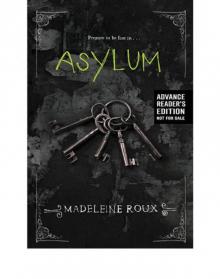 Asylum
Asylum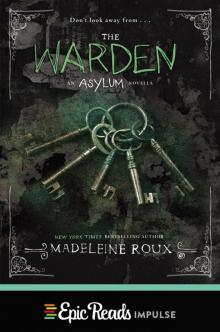 The Warden
The Warden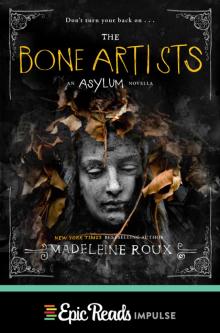 The Bone Artists
The Bone Artists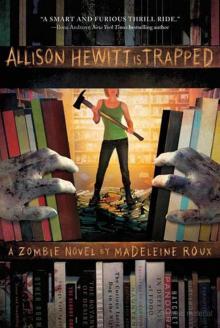 Allison Hewitt Is Trapped
Allison Hewitt Is Trapped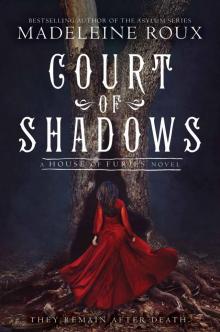 Court of Shadows
Court of Shadows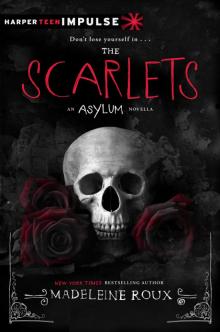 The Scarlets
The Scarlets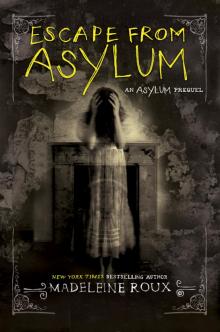 Escape From Asylum
Escape From Asylum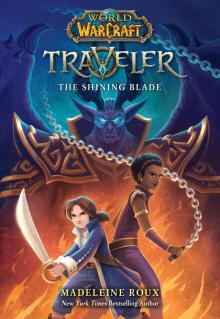 The Shining Blade
The Shining Blade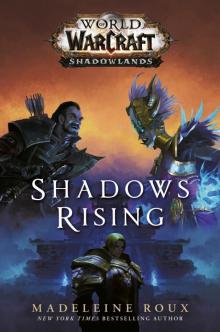 Shadows Rising (World of Warcraft: Shadowlands)
Shadows Rising (World of Warcraft: Shadowlands)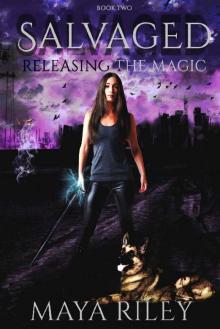 Salvaged
Salvaged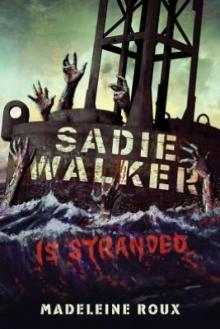 Sadie Walker Is Stranded
Sadie Walker Is Stranded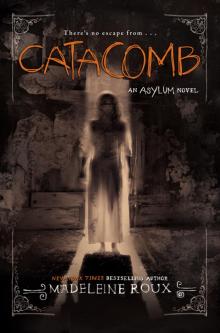 Catacomb
Catacomb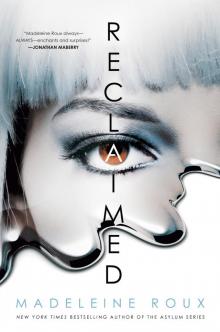 Reclaimed
Reclaimed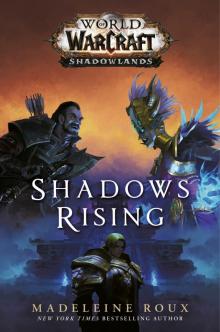 Shadows Rising (World of Warcraft
Shadows Rising (World of Warcraft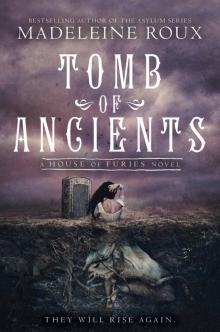 Tomb of Ancients
Tomb of Ancients